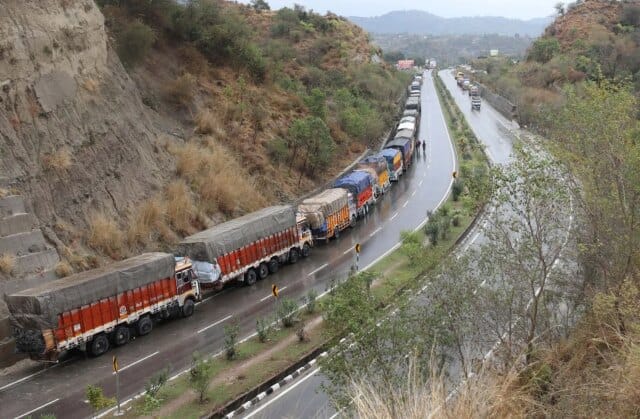Srinagar, Sep 15: Kashmir’s horticulture sector, the backbone of its economy, generating more than Rs 20,000 crore annually, is facing mounting losses due to the prolonged disruption of traffic movement on the Srinagar-Jammu National Highway.
For nearly 20 days, hundreds of fruit-laden trucks have been stranded, leading to large-scale damage to perishable consignments and pushing thousands of growers into distress.
On Monday, over 10,000 fruit growers held silent protests across mandis in Kashmir, demanding urgent intervention for the restoration of smooth traffic movement.
Carrying placards and staging sit-ins, they warned that the ongoing highway blockade had thrown the entire horticulture economy into chaos.
Chairman of the All Kashmir Fruit Growers Union, Bashir Ahmad Basheer, representing more than a dozen fruit mandis, described the situation as unprecedented.
“We are caught between the devil and the deep sea. If fruits are not harvested, they fall from the trees, and if harvested, they rot in stranded trucks. Either way, the losses are unbearable,” he said.
A delegation of fruit growers met Lieutenant Governor Manoj Sinha at Raj Bhawan and sought his direct intervention.
“We informed him that fruit growers have already suffered losses running into several thousand crores. If the situation continues, small orchardists will be crushed under financial burden,” Basheer said. “The LG assured the delegation that fruit-laden trucks would be given priority passage on the Srinagar-Jammu National Highway and directed officials to ensure smoother movement of vehicles.”
In a memorandum submitted to the LG administration, the Kashmir Valley Fruit Growers-cum-Dealers Union said consignments of Babogosha, Ghalamast, Red Ghala, and other early varieties had already perished in stranded trucks.
“The growers and dealers apprehend losses worth crores. Despite repeated appeals, the authorities have failed to provide relief,” the memorandum said.
The Kashmir Valley Fruit Growers-cum-Dealers Union also accused the government machinery of giving clearance priority to trucks owned by cold storage operators, leaving ordinary growers sidelined.
They criticised the decision to allow only sixty-tyre trucks via Mughal Road, arguing that larger 10-14 tyre vehicles were essential for bulk apple and pear consignments.
The Kashmir Valley Fruit Growers-cum-Dealers Union said that smaller trucks not only reduce carrying capacity but also charge up to 300 percent higher freight, further burdening farmers.
Adding to the woes, the recent devastating floods in south Kashmir have damaged orchards, uprooted fruit trees, and wiped out standing crops.
The Kashmir Valley Fruit Growers-cum-Dealers Union termed the calamity a “natural disaster” and demanded compensation for affected orchardists.
The growers’ charter of demands included immediate restoration of the Srinagar-Jammu National Highway and clearance of all stranded trucks, daily priority passage for fruit vehicles even against convoy movements, waiver of KCC loans for small orchardists, a comprehensive compensation package for flood-hit growers, and railway connectivity with warehousing hubs for mandis, particularly Sopore.
They also urged the deputation of officers from Sher-e-Kashmir University of Agricultural Sciences and Technology (SKUAST) and the Horticulture Department to assess field-level losses.
Despite LG’s assurance, growers remain skeptical.
“Assurances must translate into action. Horticulture sustains nearly seven lakh families in the Valley. If these trucks are not moved immediately, Kashmir’s economy will suffer irreparable damage,” Basheer warned.
With the apple harvesting season at its peak and mandis overflowing with produce, the crisis has underlined Kashmir’s fragile dependence on the Srinagar-Jammu as its sole economic artery.
Unless urgent measures are taken, fruit growers fear that Kashmir’s largest employment-generating sector is heading toward one of its worst seasons in decades.








